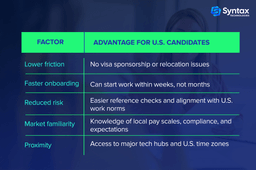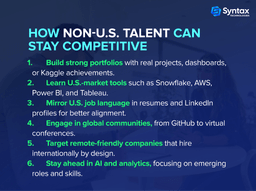The tech job market in 2025 looks very different from just a few years ago. For years, U.S. companies heavily relied on international talent to power innovation, especially in fields like data analytics, AI, and software engineering. But policy shifts, soaring demand for specialized skills, and rising hiring costs have tilted the balance. Today, U.S.-based candidates find themselves with a distinct edge in the hiring game.
This shift isn’t about companies shutting the door on global talent. Instead, it’s about how businesses are adapting to a tight labor market, new visa realities, and the urgency to fill high-demand roles quickly. This article explores why U.S. candidates currently hold the advantage, the factors driving this trend, and how international professionals can still compete in a rapidly changing landscape.

What’s Changing in 2025 (and Why It Matters)
The advantage U.S. candidates have today didn’t come out of nowhere. It’s the result of several shifts happening in the tech job market. Here are the biggest ones shaping the hiring landscape:
1. The Skills Gap Isn’t Closing
- 76% of employers in 2025 still struggle to fill roles (barely down from 80% last year).
- Tech roles are especially tough — companies want specialists with deep skills (e.g., SQL + statistics + domain knowledge).
- Nearly 70% of analyst job postings now ask for specialists instead of generalists.
- U.S.-based candidates are often seen as more “ready-to-go,” which tips the scales in their favor.
2. Visa and Immigration Hurdles
- Hiring international talent involves visa sponsorship, relocation, and compliance costs.
- Big players like Amazon, Microsoft, Meta, and Google still hire globally, but the process is costly and competitive.
- For many firms, U.S. candidates are the faster, lower-risk option.
3. Tech Jobs and Pay Surge
- The U.S. tech job market has over 7 million postings in 2025.
- Demand is up 33% month-over-month and 16% year-over-year.
- AI roles are red-hot, with some companies paying $200,000 premiums for machine learning experts.
- High pay = higher risk for employers, so local hires often get preference.
4. Skills Over Degrees
- Companies are shifting to skills-based hiring.
- Fewer roles demand formal degrees — instead, they want proof of real ability (projects, portfolios, problem-solving).
- Global talent can compete here, but U.S. candidates still benefit from easier evaluation and onboarding.
Not a Closed Door for Global Talent
While U.S. candidates have an advantage, international talent is far from excluded. Several trends are helping level the field:
- Remote-first adoption: Many companies continue to embrace distributed teams, making global hiring viable.
- Expansion into new regions: Firms like Databricks are investing heavily in offshore hubs — committing $250 million in India for AI expansion in 2025.
- Skill-driven evaluation: Portfolios, open-source contributions, and real-world projects carry increasing weight.
- Policy fluidity: Immigration rules can change, potentially altering the balance again.
Conclusion
The 2025 hiring shift reflects a mix of talent shortages, visa complexities, rising salaries, and the move toward skills-based evaluation. These dynamics place U.S.-based candidates at an advantage, largely due to lower hiring friction and faster onboarding. However, global candidates who focus on building visible skills, aligning with U.S. market practices, and targeting remote-first employers can still carve out strong opportunities.


